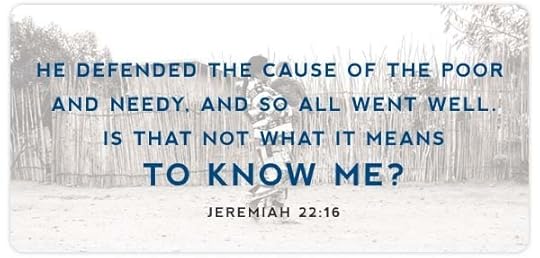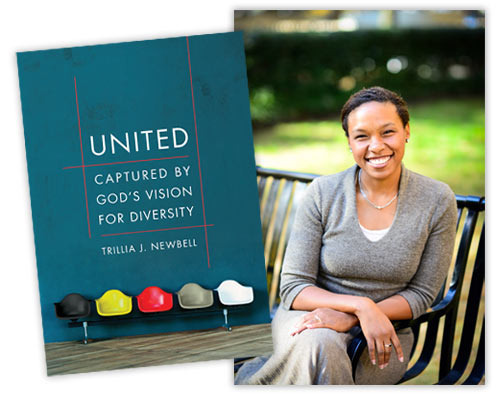Randy Alcorn's Blog, page 185
March 12, 2014
God Rejoices to Do Us Good
 In researching and writing on the topic of happiness, one of the verses I've enjoyed mediating on is Jeremiah 32:40, 41, where God says, "I will make with them an everlasting covenant that I will not turn away from doing good to them ... I will rejoice in doing good to them.”
In researching and writing on the topic of happiness, one of the verses I've enjoyed mediating on is Jeremiah 32:40, 41, where God says, "I will make with them an everlasting covenant that I will not turn away from doing good to them ... I will rejoice in doing good to them.”
Here we see the joyful enthusiasm of God in keeping all His promises. Imagine the warmth and gladness in your heart as you do something special for your child or grandchild—now magnify that many times to begin to appreciate the love and happiness of God’s heart toward us.
Writing about these verses, John Piper says,
This is one of those promises of God that I come back to again and again when I get discouraged (yes, that happens to pastors). Can you think of any fact more encouraging than that God rejoices to do you good? He doesn't begrudgingly fulfill His promise (Romans 8:28). It is His joy to do you good. And not just sometimes. Always! "I will not turn away from doing good to them."
But sometimes our situation is so hard to bear we just can't muster any joy. When that happens to me I try to imitate Abraham: "In hope he believed against hope" (Romans 4:18). God has always been faithful to guard that little spark of faith for me and eventually (not right away) to fan it into a flame of happiness and full confidence.
O how glad I am that the thing that makes Almighty God happiest is doing good for you and me!
Article from DesiringGod.org .

photo credit: Philerooski via photopin cc
March 10, 2014
Five Things We Miss If We Don’t Give, Especially to the Needy

If we don’t reach out in our giving, as individuals and as churches, we miss out on a central aspect of biblical teaching: God’s deep concern for the poor and needy. It was said of King Josiah, “He defended the cause of the poor and needy, and so all went well. Is that not what it means to know me?” (Jeremiah 22:16).
When we choose not to give, we miss out on several things:
1. Christlikeness
Christ is the ultimate giver (2 Corinthians 8:9). “Grace” is giving, and Jesus was full of grace and truth. Giving is an expression of his basic nature. We give because he first gave to us.
2. Great Privilege
When the Macedonians were told they didn’t need to give because they were so poor themselves, they “urgently pleaded…for the privilege” of giving to the needy (2 Corinthians 8:4).
3. Blessing
Jesus said, “It is more blessed to give than to receive” (Acts 20:35).
4. Evangelistic Opportunities
So many of these opportunities come when we reach out to the poor. Jesus said people would know us by our love for one another. After explaining how the early church would sell their assets to give to the needy, Scripture tells us God added to the church’s numbers daily (Acts 2:47). No wonder, since their radical concern for the needy could only be explained by a powerful work of God.
5. Eternal Rewards
By failing to reach out to the needy, we miss out on eternal rewards, because Jesus said if we give to those who can’t pay us back, God himself will pay us back by rewarding us in heaven (Luke 14:14).

Related Resources
Blog: Caring for the Needy: What God Says
Book: The Treasure Principle
Photo credit: omar_franc via sxc.hu
March 7, 2014
The Need for Pro-lifers to Be Consistent When It Comes to Miscarriage
 A friend who recently experienced a miscarriage shared this powerful blog post with me (it’s received over 1,100 comments, so obviously it resonated with many). I agree with the writer’s assertion that it does seem the prolife response to miscarriage lacks consistency.
A friend who recently experienced a miscarriage shared this powerful blog post with me (it’s received over 1,100 comments, so obviously it resonated with many). I agree with the writer’s assertion that it does seem the prolife response to miscarriage lacks consistency.
I’ve long felt this issue of inconsistency, though as a man, and as someone who has not experienced it personally, the closest I’ve experienced it is when someone very precious to me lost their child. I was devastated. But that’s not the same as what the mom goes through, or the dad.
I think those going through the loss of a child by miscarriage need to be told it’s ok to grieve, knowing they’ve been parted from their real child in a real and heartbreaking way. We should pray for their healing, but NOT at the expense of reality and grieving, which are an important part of a baby-honoring and God-honoring process.
Why miscarriage matters when you're pro-life
By Rachel Lewis
Back in my former life, I was a proofreader.
We were a fabulous group of gals. But, I'm not going to lie—we were pretty nitpicky. And NOT the most popular in the office. In fact, we had not just one book, but multiple books by which we would mentally check each word, each phrase, each sentence.
We had rules about whether a dash should be the size of a capital "N" or a capital "M" (and yes, we did measure). We ensured the proper use of "insured," then assured all the writers that, yes, everyone gets those words mixed up. And of course, we must never forget to correct the spacing on an ellipsis. (#.#.#.#). Very important, that one.
But we had one rule that trumped all rules:
Consistency was king.
You see, on most issues, you could get away with breaking a rule or two -- as long as you were consistent.
And now, after both quitting my job and going through 3 first-trimester losses in a row (primarily surrounded by pro-lifers), I really wish I could say the same thing about life. And about pregnancy loss.
I must make a disclaimer (to all my friends and family reading this)—You did the best you could. And for the most part, I felt loved and I knew that so many of you grieved with me.
To be perfectly honest, before my losses, I didn't quite understand that the way we pro-lifers treat miscarriage is important.
And yet after we lost Olivia, it didn't take long for me to realize that in this Christian microcosm of ours, somehow an aborted baby had so much more to offer the world than a miscarried one.
Both babies may have died at the same gestation —one by choice, the other by chance. But the value attached to each child completely depended on how that child died.

March 5, 2014
Believers in a Culture That Is Increasingly Hostile to Christianity
 In an interview I was asked, What is your advice on how believers should deal with a culture that is increasingly hostile to Christianity?
In an interview I was asked, What is your advice on how believers should deal with a culture that is increasingly hostile to Christianity?
Jesus said, “No servant is greater than his master. If they persecuted me, they will persecute you also” (John 15:20). Followers of Jesus should expect injustice and misrepresentation. I’m grateful there are organizations working to protect the rights of Christians. But I’m concerned if we view ourselves as one more special interest group, clinging to entitlements and whining when people don’t like us. God’s people have a long history of not being liked.
Of course, this does not mean being hateful or seeking to be hated. It's important that we represent the Gospel well, and I am all for graciousness, kindness and servant-hearted love as we speak the truth. Romans 12:18 says, "If possible, so far as it depends on you, live peaceably with all."
But the fact is, while the gospel is good news, it is also insulting. Many people don’t like being called sinners and told they deserve to go to hell. Peter said, “Don’t be surprised at the fiery ordeal you are suffering as though something strange were happening to you” (1 Peter 4:12).
If our eyes are on anyone but Jesus, we’re not going to have the stamina to put up with criticism or outright hostility. Paul said, “If I were still trying to please men, I would not be a servant of Christ” (Galatians 1:10).
Jesus is the Audience of One. We will stand before His judgment seat, no one else’s. We should long to hear Him say, “Well done, good and faithful servant.” What other people think won’t matter.

Image credit: alifarid via sxc.hu
March 3, 2014
Racial Diversity and Reconciliation in the Church: United, a book by Trillia Newbell
 Trillia Newbell has written her first book, United: Captured by God’s Vision for Diversity, about friendship, diversity, and the church. Nanci and I had a delightful conversation with Trillia in September. She has great insights on her blog and articles she’s written for Desiring God, so I’m looking forward to reading United and encourage you to check it out, too.
Trillia Newbell has written her first book, United: Captured by God’s Vision for Diversity, about friendship, diversity, and the church. Nanci and I had a delightful conversation with Trillia in September. She has great insights on her blog and articles she’s written for Desiring God, so I’m looking forward to reading United and encourage you to check it out, too.
In the book, Trillia shares her unique experiences as a black woman growing up in the South, attending a predominately white college and church, marrying a white man, and raising biracial children. She explains: “Seeing the importance of diversity in Scripture should make us want to explore how we can emulate this today. Ultimately it’s all about His glory on this earth and reflecting Him to a broken world.”
I agree. God is the creator of diversity. Separation is separation, and it hurts us and our Father who wants His children to know each other and love each other and enjoy each other’s company. Sadly, I’ve heard it said that eleven o’clock on Sunday morning is the most segregated hour in America.
Trillia writes,
We can so clearly see throughout Scripture that God celebrates the diversity of His creation. He does not distinguish between races: He created man in His own image, sent His Son to save the world, and saves anyone who believes. God calls Christians to be imitators of Christ and to walk in love. If He doesn’t show partiality, neither should we. The problem with the current church model and experience for most of us is that while we affirm these truths with our lips, Sunday morning reveals a different story.
The biggest racial divide in history was between Jews and Gentiles. Writing of this divide, Paul says, “For [Christ] himself is our peace, who has made the two one and has destroyed the barrier, the dividing wall of hostility. . . . His purpose was to create in himself one new man out of the two, thus making peace, and in this one body to reconcile both of them to God through the cross, by which he put to death their hostility” (Ephesians 2:14-16).
If that barrier is broken down in Christ, so is every racial barrier. This passage says that because of Christ’s work on the cross, we’re all part of the same family. We share the same Daddy, and that means we’re family. This verse tells me that if I stand at arm’s length from brothers and sisters of another color, I am opposing nothing less than the finished work of Christ. The challenge is not just affirming that truth with our lips, but allowing it to impact our churches and families.
On the New Earth we’ll never celebrate sin, but we’ll celebrate diversity in the biblical sense. We’ll be united in our common worship of King Jesus, and we’ll delight in each other’s differences, never resent or be frightened by them. Peace on Earth will be rooted in our common ruler, Christ the King, who alone is the source of “Glory to God in the highest, and on earth peace among men with whom He is pleased” (Luke2:14, NASB).

February 28, 2014
Dogs, Human Ingenuity and Delight in God
 Our Golden Retriever Maggie got a kick out of this video, and so did we. Makes you smile, and I believe it makes God smile. It’s a little tribute to human ingenuity, as God’s image-bearers, and to canine adorability, both reflecting the creativity and beauty of God. Since the creation of the world His [God’s] invisible attributes are clearly seen, being understood by the things that are made…” (Romans 1:20).
Our Golden Retriever Maggie got a kick out of this video, and so did we. Makes you smile, and I believe it makes God smile. It’s a little tribute to human ingenuity, as God’s image-bearers, and to canine adorability, both reflecting the creativity and beauty of God. Since the creation of the world His [God’s] invisible attributes are clearly seen, being understood by the things that are made…” (Romans 1:20).
Even in this fallen world, we can see the beauty, humor and delight of God. (Human beings did not invent beauty, humor and delight, and Satan certainly didn’t!) Take the time to look around you today at beauty and creativity in this world. Then, move backward from the secondary to the Primary—God, the One behind all things that are good, and deserves the credit for them. Thank him and you’ll both be glad. “Giving thanks always and for everything to God the Father in the name of our Lord Jesus Christ…” (Ephesians 5:20).
But may the righteous be glad and rejoice before God; may they be happy and joyful. (Psalm 68:3, NIV)

February 26, 2014
Is it important how I dress for church?
 I've been asked, Do you think that how you dress is important when you attend church? Isn’t that part of showing respect for the things of the Lord?
I've been asked, Do you think that how you dress is important when you attend church? Isn’t that part of showing respect for the things of the Lord?
I think showing respect to the Lord involves different things for different people in different places. Dress is cultural. Some in jeans and t-shirts are wholly focused on the Lord, lost in worship and adoration. Some in suits and ties can sit there in anger, lust, and indifference to the Lord (just like some of those in jeans are no doubt doing, but I doubt they are doing them more).
I’m not sure there’s any dependable relationship between the quality of attire and the heart’s focus on the Lord. I know there isn’t for me—when I’m dressed up, doing a wedding or attending a memorial service, I don’t feel closer to God or more honoring to Him. I just feel like I want to get home and change. But for those who are showing more respect for God by dressing up, they are right to pay attention to that and do what prompts them most to honor Christ.
For those who are making a statement of respect for God, I think it’s great. For those who are saying, I love a God who looks at my heart not my clothing, I think that’s great too. Everybody should be convinced in his own mind. For me, my best times with God are when I’m wearing an old t-shirt and jeans and slippers, haven’t shaved, am drinking coffee, etc. I don’t feel even slightly disrespectful. Some people feel when they’re with others they have to look different before God. Maybe it goes back to the “house of the Lord” idea, but while I love worship and rich fellowship, I have never seen a church building as part of making me closer to God. If we gather at a park and worship God I tend to feel closer to Him than in a building.
Those of us who didn’t grow up in church sometimes view it differently too. I grew up in the home of a tavern owner. We didn’t dress up for anything. I came to Christ as a teenager in 1969 in a church where most of the adults dressed up, but most of the teenagers dressed casually, and the guys like me had long windblown hair too—my sideburns were a sight to behold. To have grown up in my part of Oregon, AND in a blue collar home AND in an unbelieving home where my first church experience was as a teenager, has no doubt influenced my views and habits. Just as to grow up in a church in Philadelphia, where some pastors I know wear suits and ties to staff retreats, has influenced others.
Where I live, to show up at a friend’s home in shorts and flip-flops is simply to be at ease with them and not put on airs. For most people here in Oregon, dressing up to go to a friend’s house would be really awkward. You take off your nicest clothes that you may have worn to work, then change into your most comfortable ones. To most people here dressing up is becoming uncomfortable. Rather than stay late to hang out with your friends you want to get home where you can change and get comfortable. If you want to spend a long evening together, or want to hang out late at church and have coffee, you dress more casually.
Here, dressing down is relaxing, something you do when you want to stay and hang out and have fun and enjoy each other and the Lord. Dressing up is widely viewed not as showing respect but showing off. It comes across as an attempt to impress others by looking nicer than they do. I speak to a lot of younger audiences, and when I speak at younger churches I always speak in jeans and an untucked casual shirt, but when I go to more traditional churches I dress up more, though I don’t wear a tie unless I’m asked to. :)
Personally, I never assume people are showing off or flaunting wealth, I know some just like to dress up. That’s great for them. But I’m thankful that those of us wired differently have the freedom to be casual. And what I REALLY love is when people who love to dress up and people who love to dress casually can do so together with full respect for God and each other.

photo credit: Joaquin Villaverde Photography via photopin cc
February 24, 2014
The Full Implications of God’s Ownership
From beginning to end, Scripture repeatedly emphasizes God’s ownership of everything:
“To the Lord your God belong the heavens, even the highest heavens, the earth and everything in it” (Deuteronomy10:14).
“The land is mine and you are but aliens and my tenants” (Leviticus 25:23).
“Yours, O Lord, is the greatness and the power and the glory and the majesty and the splendor, for everything in heaven and earth is yours. Yours, O Lord, is the kingdom; you are exalted as head over all. Wealth and honor come from you; you are the ruler of all things” (1 Chronicles 29:11-12).
“Who has a claim against me that I must pay? Everything under heaven belongs to me” (Job 41:11).
“The earth is the Lord’s and everything in it, the world, and all who live in it; for he founded it upon the seas and established it upon the waters” (Psalm 24:1-2).
“For every animal of the forest is mine, and the cattle on a thousand hills. I know every bird in the mountains, and the creatures of the field are mine. If I were hungry I would not tell you, for the world is mine, and all that is in it” (Psalm 50:10-12).
“‘The silver is mine and the gold is mine,’ declares the Lord Almighty” (Haggai 2:8).
Search and you won’t find a single verse of Scripture that suggests that God has surrendered his ownership to us. God didn’t die and leave the earth—or anything in it—to me, you, or anyone else. And if we should think, Well, at least I own myself, God says, “You are not your own; you were bought at a price” (1 Corinthians6:19-20).
 When teaching from 1 Corinthians 6 in a college class, I sometimes ask someone in the front row to lend me his pencil for a moment. When he hands me the pencil, I immediately take it, break it in half, throw it on the ground and crush it under my foot. The reaction of the students is shock and disbelief. What right do I have to break someone else’s pencil? But then I explain that it’s really my pencil, which I planted with that person before the session. Suddenly everything changes. If it’s my pencil, but only if it’s mine, then I have the right to do with it as I please—which is precisely Paul’s point in his letter to the Corinthians. The believers inCorinthwere doing what they pleased. And why not? They thought their lives were their own. But Paul says, “No, it’s not your life. You own nothing, not even yourself. When you came to Christ you surrendered the title to your life. You belong to God, not to yourself. He is the only one who has the right to do what he wants with your life—your body, your sexual behavior, money, possessions, everything.”
When teaching from 1 Corinthians 6 in a college class, I sometimes ask someone in the front row to lend me his pencil for a moment. When he hands me the pencil, I immediately take it, break it in half, throw it on the ground and crush it under my foot. The reaction of the students is shock and disbelief. What right do I have to break someone else’s pencil? But then I explain that it’s really my pencil, which I planted with that person before the session. Suddenly everything changes. If it’s my pencil, but only if it’s mine, then I have the right to do with it as I please—which is precisely Paul’s point in his letter to the Corinthians. The believers inCorinthwere doing what they pleased. And why not? They thought their lives were their own. But Paul says, “No, it’s not your life. You own nothing, not even yourself. When you came to Christ you surrendered the title to your life. You belong to God, not to yourself. He is the only one who has the right to do what he wants with your life—your body, your sexual behavior, money, possessions, everything.”
God doesn’t just own the universe. He owns you and me. We are twice his—first by creation, second by redemption. Not only does God own everything, but he determines how much of his wealth he will entrust to us:
“Remember the Lord your God, for it is he who gives you the ability to produce wealth” (Deuteronomy8:18).
“The Lord makes poor and makes rich; He brings low and lifts up” (1 Samuel 2:7, nkjv).
“Wealth and honor come from you; you are the ruler of all things” (1 Chronicles 29:12).
Stewardship is living in the light of these overriding truths. It’s living with the awareness that we are managers, not owners; that we are caretakers of God’s assets, which he has entrusted to us for this brief season here on earth. How we handle money and possessions demonstrates who we really believe is their true owner—God or us.

Related Resources
Blog: Depositing This Life in Eternity's Account
Book: Managing God's Money
Photo credit: ppreacher via sxc.hu
February 21, 2014
The Importance of Relaxation
Like jackrabbits on a hot tin roof, some of us are never still—always doing, always going. We strive to justify our worth by creating motion. Do the laundry, plant the flowers, wash the floor, attend the meeting, make the phone call, plan the dinner…all worthwhile activities if we also stop long enough to breathe and think and grow and relax.

Paradoxically, in an age of more leisure time, we take very little in a leisurely way. We vigorously pursue our leisure time activities, turning play into work. Remember when you were a child, how hours at a time were lost in the joy of play—discovering trees and trails and caterpillars and the new friend on the block? Kids don’t need to justify playing. It is its own justification.
But as adults, we’re tyrannized by the ticking of the clock. We frantically wrestle with life instead of sitting back to enjoy it.
Even our vacations are planned with the precision of a military maneuver (men are particularly guilty here). “We’ll relax and have fun beginning tomorrow morning at 6 a.m. when we pack the car and hit the freeway. We will then drive five hundred miles, stopping only for gas, food, and emergency bladder failures, and we will make every effort to synchronize these events.” And we wonder why we and the kids get cranky on vacations!
Feeling guilty about relaxing is self-defeating, isn’t it?
The auto-maker never intended your car to run day and night, accelerator to the floor. Your Maker never intended you to go nonstop either. In fact, one of the Ten Commandments—right up there with no false gods, no murder, and no adultery—is a divine mandate to quit working and get regular rest (Exodus 20:8-11).
God doesn’t just permit or recommend rest—He commands it. Refusing to relax is not only unhealthy, it’s disobedient.
So this weekend, take time to relax. And relax in the knowledge that doing so is God’s very best for you and your family.

Related Resources
Blog: Enjoying Rest, Now and in the Life to Come
Book: Help for Women Under Stress
photo credit: WhatDaveSees via photopin cc
February 19, 2014
G.K. Chesterton on Marriage and Men and Women
My daughter Karina recently posted this from one of her favorites and mine, G.K. Chesterton (British journalist, writer, and Christian apologist, 1874-1936). He has a number of great books, nonfiction and fiction. If I were to choose just one as my favorite, it would be The Everlasting Man. I also like his Father Brown mysteries, his book Orthodoxy and his little (and little known) biographies of Aquinas and Francis of Assisi.
Two stubborn pieces of iron

Very few people ever state properly the strong argument in favour of marrying for love or against marrying for money. The argument is not that all lovers are heroes and heroines, nor is it that all dukes are profligates or all millionaires cads. The argument is this, that the differences between a man and a woman are at the best so obstinate and exasperating that they practically cannot be got over unless there is an atmosphere of exaggerated tenderness and mutual interest. To put the matter in one metaphor, the sexes are two stubborn pieces of iron; if they are to be welded together, it must be while they are red-hot. Every woman has to find out that her husband is a selfish beast, because every man is a selfish beast by the standard of a woman. But let her find out the beast while they are both still in the story of "Beauty and the Beast." Every man has to find out that his wife is cross—that is to say, sensitive to the point of madness: for every woman is mad by the masculine standard. But let him find out that she is mad while her madness is more worth considering than anyone else's sanity.
—G.K. Chesterton, The Common Man

Related Resources
Blog: Advice for Engaged Couples
Book: Courageous







